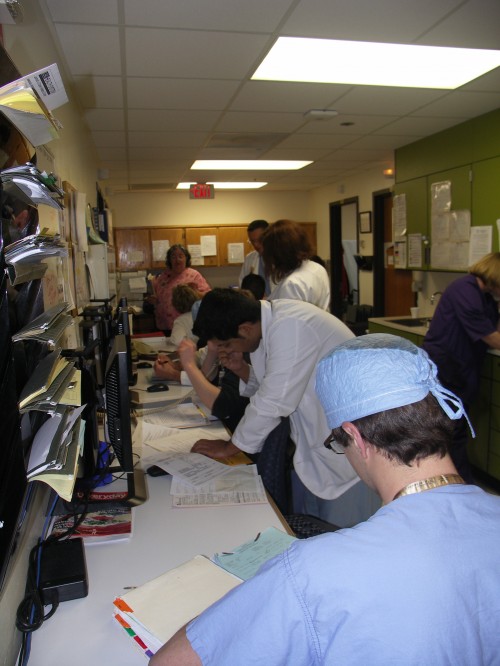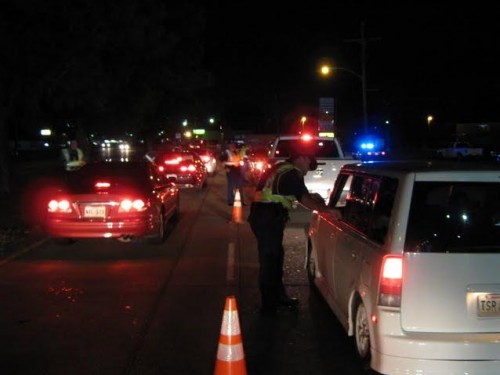
Chabert cuts jobs, finalizing changes
March 12, 2012St. Patty’s parade makes comeback
March 12, 2012Gov. Bobby Jindal announced last week seven legislative measures to crack down on DWIs.
“By the sounds of the proposed legislation, it seems they are getting stricter on things,” Houma Police Chief Todd Duplantis said. “Any legislation that would help strengthen DWI laws would help, and I am for strengthening the enforcement of DWI laws.”
According to Duplantis, HPD saw a 17 percent increase in DWI arrests from 2010 to 2011.
“We arrested 129 individuals for DWI in 2010, and we arrested 155 in 2011,” the police chief said. “There were also very few DWI fatalities worked by the Houma Police Department last year.”
HPD works with Louisiana State Police and other local law enforcement when conducting DWI checkpoints.
“In the past three years, we have seen a significant decrease in DWI-related fatality crashes in the area,” Louisiana State Police Troop C spokesman Trooper Evan Harrell said. “There has also been a 40 percent increase in DWI arrests statewide, since Gov. Jindal took office.”
According to Datareports.lsu.edu, a compilation of statistical data based on information obtained on traffic crashes submitted by state, sheriff, and local police agencies throughout the state of Louisiana, last year there were eight alcohol-related crashes and nine alcohol-related fatalities in Terrebonne; seven alcohol-related crashes and seven alcohol-related fatalities in Lafourche; and six alcohol-related crashes and six alcohol-related fatalities in St. Mary.
In 2010, there were 11 alcohol-related crashes and 13 alcohol-related fatalities in Terrebonne; eight alcohol-related crashes and 10 alcohol-related fatalities in Lafourche; and four alcohol-related crashes and four alcohol-related fatalities in St. Mary.
“With the increase in arrests and the decrease in fatalities, the awareness is out there, and we would like to see the trend continue,” Harrell said.
Legislative proposals have been approved by the DWI-Vehicular Homicide Task Force and will be proposed as a part of the Governor’s 2012 Legislative Package.
“This legislation will add to tools to the arsenal for us to continue to be able to prosecute DWI offenders to the fullest extent of the law, as we do now,” Terrebonne Parish First Assistant District Attorney Carlos Lazarus said. “Catching them is not the problem right now. We need more alcohol and drug abuse treatment. Without out that, we are pouring a waterfall into a thimble. This legislation will help to provide that treatment for first and second time offenders. That wasn’t in the legislation before.”
The newly proposed laws were drafted by state Sens. Fred Mills (R-New Iberia), Johnathan Perry (R-Abbeville) and Bodi White (R-Central).
The first piece of legislation, drafted by Mills, would give law enforcement officers the capacity to use several tests to determine drug or alcohol impairment because current law does not state whether several test can be used legally by an officer.
The breathalyzer test can only identify the presence of alcohol and if the offender is under the use of drugs, the law does not clearly state that an officer can ask for and utilze in court a blood or urine test.
Under the proposed legislation, an officer will be allowed to use multiple tests to determine whether the offender has been using drugs or alcohol, and if the offender refuses the tests, his or her license may be suspended under the Implied Consent Law.
The second piece of legislation, drafted by Perry, would mandate that those who refuse drug and alcohol tests to serve a driver’s license suspension.
Before the passing of Act 605 in 1992, Louisiana utilized a “two-track” drivers license suspension law. The first, the Implied Consent Law, suspends driving privileges for individuals arrested for DWI who failed or refused testing. The second was used only when the individual was convicted of a DWI charge.
A productive defense with of one of the tracks was not an inevitable defense of the other. Unforeseen, Act 605 provided a new means of defense. A dismissal, acquittal, completion of a pre-trial diversion program or plea to a lesser offense on the criminal procedure track allowed the individual to restore his or her driving rights subject to the Implied Consent Law.
Repealing Act 605 will mandate that an individual who fails or refuses testing will have to serve a drivers license suspension unless a productive defense is shown at the Implied Consent Law hearing.
The third piece of legislation, drafted by Mills, would mandate a substance abuse disorder evaluation, performed by the Department of Health and Hospitals, for first and second DWI offenders (currently only required of third time offenders) to determine if the defendant suffers from alcoholism or occasional substance abuse. This will help to determine the suitable sentence for DWI offenders.
The fourth piece of legislation, drafted by Perry, will deem it illegal for a person to operate a vehicle with perceptible amounts of controlled dangerous non-medically prescribed drugs in his or her system.
The fifth piece of legislation, drafted by White, would elongate the ten years that grants extra penalties for repeat DWI offenders. If an individual commits a second DWI within 10 years of the first, he or she is subject to enhanced penalties. During the 10 year period and while awaiting the second trial, probation and incarceration in a penal institution is not counted, and the 10-year period is extended to start when the probation or incarceration has ceased.
Still, present law counts the time an offender is on parole during that 10 years. Due to the fact that several individuals convicted of felony DWI are placed on parole instead of probation, the parole time should not be counted in the 10-year period. The new legislation would not include the parole time.
The sixth piece of legislation, drafted by Perry, would equalize penalties for persons with two DWI offenses and would change current legislation that allows someone convicted of a second DWI to be eligible for a hardship license after 45 days if his/her vehicle is equipped with an ignition interlock device.
Also, if that person had a blood alcohol concentration of 0.2 percent or higher, his driver‘s license must be suspended for four years. With a BAC of more than 0.2 percent, the offender is presently able to apply for a hardship license during the four year period, so long as his vehicle has an ignition interlock device. The offender does have to wait the 45 days to apply for the hardship license.
Under the new legislation, a person convicted of a second offense DWI with a blood alcohol concentration of 0.2 percent will only be able to apply for a hardship license within the first 45 days after having his license suspended.
The seventh piece of legislation, drafted by Perry, would address the penalties of individuals with three DWI offenses.
Presently, an individual with a guilty plea or a conviction of a third DWI offense has his driver‘s license suspended for three years, and he can apply for a restricted drivers license after 12 months, if the vehicle has an ignition interlocking device. These individuals must attend work to meet court requirements.
New legislation will only allow third-time offenders registered in a state DWI or drug court and in good standing, to be able to put in for an ignition-interlock-hardship-restricted driver’s license by decree of the presiding judge after 45 days of suspension.
The individual would only be permitted to drive to maintain a livelihood or to attend chemical dependency treatment sessions or meetings. A judge can take away the driving privileges at his or her preference. These offenders will be subject to intense supervision and drug screening by DWI court staff.
Police officers inspect cars at a DWI checkpoint. New legislation has been adopted that some say will curb DWIs in Louisiana.










